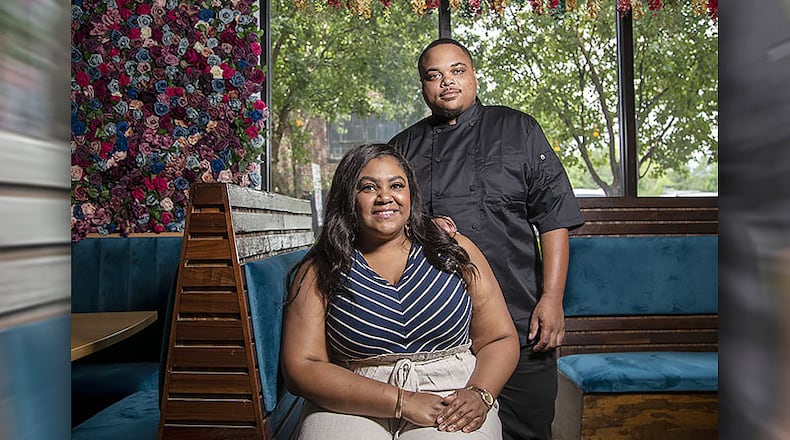The standoff between Chef’d Up and Perennial Properties epitomizes the current state of affairs for many businesses and landlords.
Jessica Booth, owner of the Old Fourth Ward restaurant, says she can’t afford to pay rent on Monday. But her landlord, Perennial, expects payment in full.
Booth said she’s asked for a rent deferral or abatement, since she doesn’t have enough to cover the $8,000 that’s due. Chef’d Up is doing only a fraction of the business it did before the coronavirus pandemic and the restrictions that have come with it.
But, she said, her requests have gone nowhere.
“Their unwillingness to cooperate has been shocking,” she said. “Our business is down at least 70%.”
Perennial, which owns Highland Walk Apartments where Chef’d Up rents its ground-floor space, tries to work with its tenants to devise a solution, and it’s been Booth who is unwilling to cooperate, said company vice president Jay McGinnity.
“We’re trying to be flexible and work with each tenant’s situation,” he said.
Many businesses can't pay rent either because they remain closed or sales have tumbled. Many landlords worked with tenants in April and May. But they also have bills to pay, and, for some, patience is running thin.
“We just collect the rent money, then pass it out to our employees’ salaries, pay taxes, utilities and insurance, and we still have to pay the bank,” McGinnity said.
In the U.S., about 45% of total retail rents for April, or $7.4 billion, remained unpaid as of May 27, according to real estate data firm CoStar. The problem is particularly troublesome in malls, where 75% of rents are unpaid.
Landlords' hands are tied for the time being. They can send default letters or eviction warnings to businesses that are late on rent, but commercial eviction notices won't proceed while Georgia courts are closed, said David Metzger, a real estate attorney in Decatur. A commercial landlord can change the locks on a tenant's business only if their lease specifically allows it.
Residential evictions, in contrast, are allowed in Georgia and thousands have been filed.
Federal bankruptcy courts, however, remain open and that’s where some landlord-tenant disputes are playing out. Car rental giant Hertz and clothing retailer J.Crew both filed for bankruptcy this month. Hertz said it won’t pay rent for the next six months and J.Crew is skipping rent the next two months.
As more businesses like these, as well as mom-and-pop stores, fall behind on rent, landlords themselves will file for bankruptcy, according to real estate experts.
Some states have moved to help tenants survive. The California Senate this month approved a moratorium on commercial evictions and legislation to allow tenants to walk away from lease agreements.
Jamestown Properties, owner of Ponce City Market and the Westside Provisions District, has set aside $50 million to provide tenants with financial assistance on rent, social media marketing, procuring signage for social distancing and other means to reopen. The fund helps both sides because Jamestown would be stuck with vacant properties if tenants go out of business, said company president Michael Phillips.
“We’re all in this together,” Phillips said. “I’d like to say it’s all altruistic, but it’s also a good longterm business management decision.”
Landlords with less financial flexibility must work with tenants in other ways, like crafting lease adjustments, Metzger said.
The federal Paycheck Protection Program loans have helped many tenants tread water for the past two months. The loans can be forgiven if a certain portion is used to pay rent.
“That gave companies two-and-a-half months of what I will call oxygen,” said Tom Tindall, a managing principal at Cresa in Atlanta. Tindall represents tenants in lease negotiations.
Many of Highwoods Properties’ tenants used PPP funds for rent, the company said. Highwoods, which owns 5.4 million square feet of office space in metro Atlanta, said on April 21 that it had collected 95% of rent payments for the month. It has not provided a more recent update.
While many office tenants have coped, retailers and restaurants are having a harder time. Federal relief loan funds are running out.
“It was an eight-week fix, but this will need more than eight weeks,” said Duncan Miller, a real estate attorney at Morris, Manning & Martin.
Booth, owner of Chef’d Up, received both a PPP loan and an emergency disaster loan. She used the loan proceeds for April and May rent. But, with June rent due, her cash flow has dried up. Chef’d Up would normally generate as much as $8,000 in sales on a Saturday. But on May 23, it only made $1,400.
She said McGinnity encouraged her to add take-out service to supplement dining-room service. But the upscale soul food offerings at Chef’d Up aren’t conducive to carry-out or delivery.
“My restaurant was not set up for take-out, it was set up for people coming in and having an experience,” she said. “Shrimp and grits or a $30 lamb chop dinner is not what you want from DoorDash.”
About the Author
Keep Reading
The Latest
Featured



